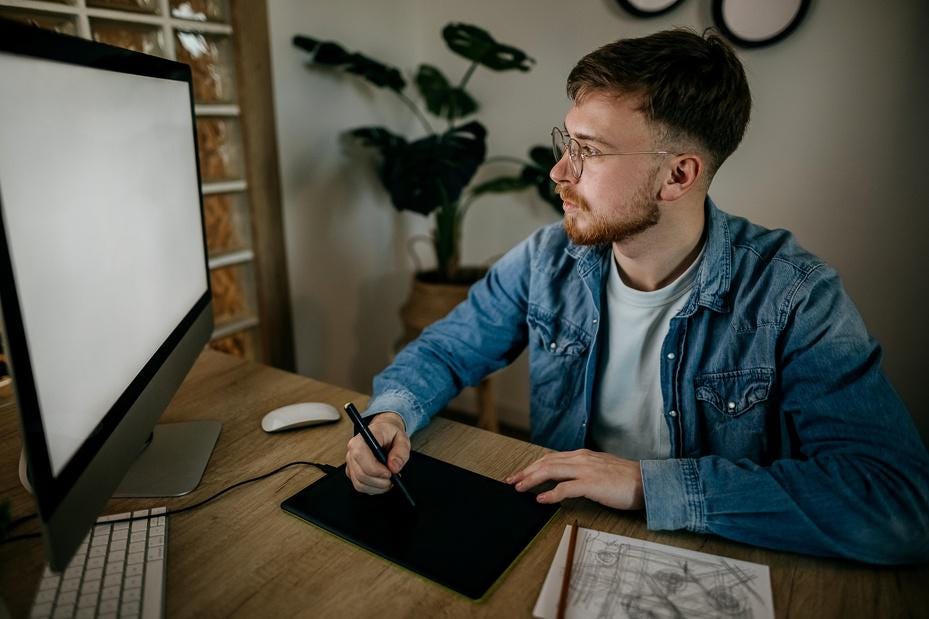How AI Is Changing The Future Of Creative Enterprise

Jean-Baptiste Hironde is the CEO and Co-Founder of the mobile app development and publishing studio MWM, based in Paris, France.

The world of creative arts and media is rapidly changing thanks to the integration of artificial intelligence (AI). AI has lowered the barrier to entry for creative fields like graphic design and music production. People who lack technical expertise can now partially bridge that gap with AI tools and their creative vision, allowing more people to enter the space. Technology is advancing and redefining what companies can accomplish due to its seemingly unlimited potential.
Chatbots, like the viral ChatGPT, are now available on mobile devices, making it even easier for consumers and companies to take advantage of AI in creative enterprises. With seamless UX and backend AI, these apps provide a cost-effective and time-efficient way for users to learn digital skills without coding. The mobile AI market is expected to be valued at $9.68 billion by 2027, up from $2.14 billion in 2021, according to a Mordor Intelligence report. Virtual assistants and chatbots will become more commonplace, but there’s also enormous potential in folding AI technology into existing mobile apps and tools to elevate what they can offer to creatives.
Blurring The Lines Between “Professional” and “Consumer” Software
With AI, users can collaborate to create something greater than they could achieve alone.
AI tools that were once complex and time-consuming are now faster and more consumer-friendly. Soon, the line between “professional” and “consumer” software tools will blur as they merge and significantly impact business models, similar to how the streaming and subscription models revolutionized their respective industries. It will be fascinating to observe how industry giants such as Adobe adapt to these changes, as they have already invested significant effort in staying up-to-date with their offerings by developing tools like Premiere Rush for content creation. With the emergence of future AI tools capable of wiping out half of Photoshop’s functions, Adobe needs to act fast.
The creative enterprise industry is undergoing what the mobile phone industry was experiencing in the early 2000s, but with the incredible acceleration of today’s tech. Because of the rapid advancements being made within the creative sector through AI integration, the possibilities for what may be accomplished in the near and long term are endless. In just the short amount of time that AI has been accessible to consumers, it has transformed search engines and art profoundly. AI will only continue to revolutionize what is possible in the coming years, with creatives able to leverage its capabilities with their knowledge and expertise to create anything, including art, music, movies, and more.
Democratizing Creative Enterprise
The creative landscape is currently being democratized as AI lifts the barrier of entry that used to deter many talented people from pursuing their creative passions. In the past, the creative industries were seen as exclusive clubs, but now more people are getting involved, and AI is providing crucial support to help them realize their artistic visions. With AI, there is also less fear of failure, as it enables people to achieve what they imagine more often than not.
Through all of the advancements being made within creative enterprises by way of the enhanced capabilities of AI, it has never been a better time to get into the industry. The thinking that specific ideas were believed to be impossible to create, too challenging to navigate or too bold to imagine is now becoming obsolete and irrelevant because of AI. By befriending AI and using it as a resource and tool to inspire and bring about increased ingenuity, people can create anything they can think of without the restrictions of yesteryear. By demonstrating an innate understanding of AI and how it can be used and leveraged, prospective creatives will also make themselves more valuable in the eyes of the companies at the forefront of the industry.
As we look ahead to the future of creative enterprise, companies need to embrace the integration of AI. Those who can quickly adapt and leverage AI tools will gain a competitive advantage and be better positioned to push creative boundaries. The potential for AI to transform the creative landscape is limitless, and it is an exciting time to be a part of this evolution.
